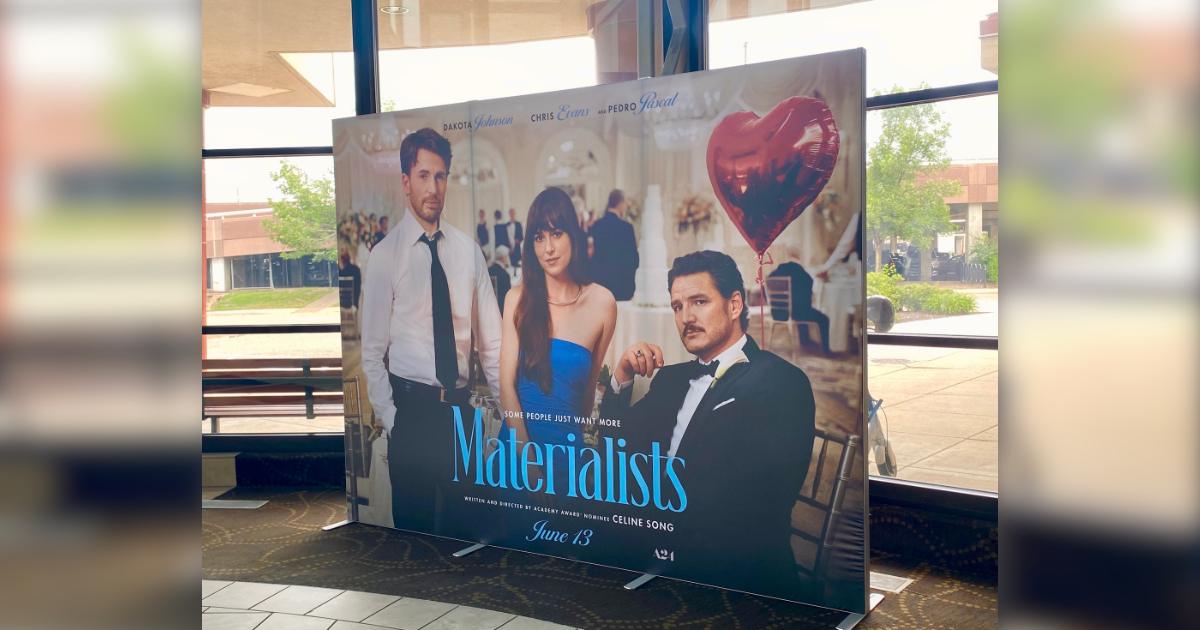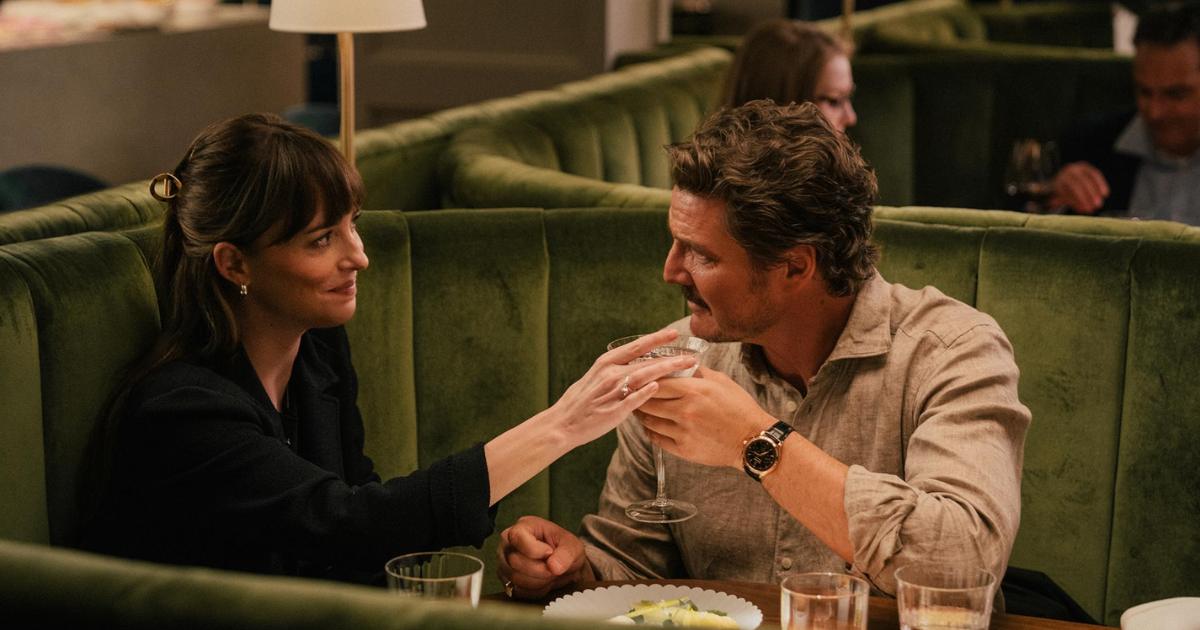Reading Time: 9 Min.
Date Published: June 13, 2025 11:53 am
Author: Darci Johnson
Article Contents
*Spoiler Alert! This review contains spoilers for the plot of Materialists.*
As a part of the Matchmaking Company team, I’ve spent years watching clients navigate the nuanced, often messy terrain of modern romance: decoding dating patterns, discovering compatibility, and helping their clients build meaningful relationships.
So when I heard that Materialists, the new romantic comedy from Past Lives director Celine Song, was about a matchmaker caught in her own romantic entanglements, I knew I had to see it, not just as a moviegoer, but as someone deeply embedded in this profession.
Naturally, I walked into the theater with a notebook (yes, really) and a healthy dose of skepticism. Hollywood doesn’t exactly have a stellar track record when it comes to depicting matchmaking with nuance.
But to my surprise, Materialists struck a more complicated tone. While it certainly indulges in its fair share of fantasy, the film also captures the brutal truths, ethical dilemmas, and emotional intimacy baked into the matchmaking business.
So, when it comes to the world of curated romance, does Materialists get it right? Here’s my professional take, popcorn grease and all.

A poster for Materialists at the movie theater.
💡 What the Film Gets Right About Matchmaking
Celine Song’s own past life as a matchmaker gave her plenty of writing fodder. There were several things in Materialists that felt grounded and realistic to me as a fellow dating industry insider.
Dating is Brutal
Lucy’s clients are unapologetically superficial. They want men over six feet tall, with full heads of hair, Ivy League degrees, and corner-office jobs. Women with never-expanding waistlines and ever-youthful skin. It’s not exaggerated—this is the kind of checklist thinking we see every day in client intakes.
But what the movie shows subtly (and what we see plainly in real life) is that this approach rarely leads to real connection. The clients who thrive in our program aren’t the ones focused on status symbols—they’re the ones open to exploring meaningful compatibility. You can want someone attractive and successful, but if you can’t also articulate what kind of emotional life you want to build together, it won’t get far.
What the film captures well is that this isn’t just about vanity. It’s about how desirability gets reduced to numbers in the age of swipes and stats. But it also shows that the superficial rules can be broken. Lucy herself is drawn to John, who lacks every “ideal” marker, yet challenges her in all the right ways.
Real connection doesn’t always follow the math. That’s what keeps our work interesting.
It’s Hard Out There for Short Guys
The value of men’s height in the dating marketplace is an overarching motif in the film. Many of Lucy’s clients won’t consider a man who is under six feet tall. Lucy herself even admits that how tall a man is has a real affect on his dateability, at least according to her “math”.
“Six inches can double a man’s value in the marketplace.” – Lucy, Materialists
@itsyourfilmsis @A24 really does the most 👀 Girls, bring those boys to the theater this weekend and casually walk him beside this ad 💅🏼 #materialists #materialistsmovie #dakotajohnson #pedropascal #chrisevans #movies #moviemarketing #movietok #a24 ♬ original sound - Film Sis | Movie + TV Talk
And it turns out that even Harry, Lucy’s “unicorn”, made an investment in a painful surgical process to add six inches to his height. He tells Lucy that the surgery was worth it, because it made him—you guessed it—six feet tall.
This film doesn’t shy away from highlighting how difficult it is to date as a short guy. In the superficial world of apps and algorithms, many men believe that a height measuring 5’anything” might as well make you invisible.
Well it turns out that while height does matter to women, there is still hope for short guys. The things that women really want from men are not so surface-level. Just like Lucy says throughout the film, it’s about someone who makes you feel as valuable as you are.
The Matchmaker-Client Bond is Tight
Lucy loves her clients. She calls for feedback after every date. She keeps a notebook full of details so she never forgets anything important. She is heartbroken when her clients’ dates don’t work out, because she’s deeply invested in them as people.
One of the realest parts of the plot is actually the catalyst for the whole plot. Like Lucy, several of our matchmakers have introduced clients who later got married, and our matchmakers are always honored to receive a wedding invitation.
You can’t get that kind of care and support from a dating app.
Recently, one of our own Matchmakers, Oliver, attended the wedding of clients Brian and Dawn. Seeing your clients get their happily ever after is one of the most rewarding parts of being a matchmaker.
Nobody is Perfect, Not Even the Pros
Lucy is polished, stylish, and insightful—but she also chain-smokes, dates clients, and uses a personal cell number for business calls. These are red flags in real life, but they serve the story well: matchmakers are not therapists or saints. They’re human. With their own wounds, their own blind spots.
The best matchmakers bring their whole selves to the job—but they also know where to draw the line. Which brings us to…
🚩 Where the Film Misses the Mark
While there were certain parts of this film that were very realistic, Materialists is also full of movie magic. A few times during the hour and fifty minute runtime I cringed and whispered to my partner, “That’s not how it would happen.”
Here are the moments that weren’t so realistic:
Harry’s Client Journey
Let’s be clear: matchmaking clients should not expect to date their matchmaker. Harry’s journey beginning on a first date with Lucy is far from the typical client experience. And Lucy conducting herself this way while her colleagues were none the wiser is a violation of professional ethics.
As a client, flirting with your matchmaker might land you a nervous laugh, but it won’t land you a dinner date. Real-world matchmakers operate with clear, formal boundaries. We aren’t here to be pursued or to pursue. The client-matchmaker relationship is built on trust, and crossing that line is a betrayal. The entire scenario felt like a rom-com contrivance that undermines the profession’s legitimacy.
While Lucy does begin her client relationship with Harry in very murky territory, I do give her some amount of credit for eventually passing off a “unicorn” (also not something we say, btw) to one of her fellow matchmakers.

Image: A24 on YouTube
Lucy’s Boundaries In General
Yes, matchmakers wear many hats—mentor, stylist, sometimes even therapist-lite. But what Lucy does in Materialists crosses the line from dedicated to destabilizing.
The most glaring example is when Lucy disguises herself in a trench coat and baseball cap to confront Sophie, a former client, on the street. It’s meant to be funny—a nod to classic rom-com antics—but in the context of a client who has ended their professional relationship with her, it reads as invasive.
In the real world, a move like that would be completely inappropriate. Once a client parts ways, it’s our job to respect that boundary, not ambush them for closure.
That moment isn’t isolated, either. Throughout the film, Lucy communicates with clients via her personal phone. Her voicemail is casual and blurred: “This is Lucy with Adore Matchmaking.” There’s no separation between her personal and professional identity.
None of this reflects how professional matchmaking works. In our field, structure is care. We support our clients without overwhelming them, and we make sure they feel safe—not just with their dates, but with us. That means scheduled check-ins, clear communication channels, and defined boundaries around when and how we engage.
💘 The Love Triangle: Messy, Complex, and Emotionally True
At the core of Materialists is a romantic dilemma: should Lucy choose the man who offers financial security and admiration (Harry), or the man who shares her history, her struggles, and her mess (John)?
It’s a question we hear clients wrestle with constantly. Not just “who do I want?”—but “who makes me feel most like myself?”
Harry: Perfect on Paper
Harry is supportive, gentle, and rich. He listens to Lucy and seems to genuinely admire her intelligence and independence. But he also lives in a completely different reality—a penthouse, a personal chef, curated vacations.
Lucy feels flattered in his world, but not grounded. The power imbalance is ever-present, even when he doesn’t intend it. During their first night together, when Lucy gawks at his home’s opulence, it’s clear she doesn’t see herself belonging in that world. She’s performing—elegantly, but still performing.
John: Flawed and Familiar
John, by contrast, represents emotional history and shared roots. Their relationship has been through fire, including bitter arguments about money and ambition. But he knows her baseline. He sees the version of Lucy that existed before the business cards and curated image.
When he tells her he’ll get an agent and pursue stability, it’s not a line—it’s an acknowledgment of her needs. He wants to rise with her. That kind of shift, if sincere, can be transformative in a relationship.

Image: A24 on YouTube
 So Did She Choose Right? (Spoiler Alert!)
So Did She Choose Right? (Spoiler Alert!)
The film doesn’t spell it out with a big, happy bow, but yes, I believe she did. Lucy doesn’t choose John because she wants to rescue him. She chooses him because he’s willing to meet her where she is. Not just financially, but emotionally.
It’s not about status. It’s about balance. And even though Harry offered the dream, Lucy chose the person who made her feel more real.
 Final Takeaway: Is Materialists Realistic?
Final Takeaway: Is Materialists Realistic?
Yes—and no. The ethical lines are blurry, and the logistics of matchmaking are wildly simplified. But the emotional truths are spot-on.
Materialists understands that love is never just a calculation. It’s a gamble. And while compatibility does matter (similar values, financial alignment, mutual effort), the magic happens when both people choose each other, fully and consciously, again and again.
In that sense, it’s one of the more emotionally realistic portrayals of dating I’ve seen onscreen.




 So Did She Choose Right? (Spoiler Alert!)
So Did She Choose Right? (Spoiler Alert!) Final Takeaway: Is Materialists Realistic?
Final Takeaway: Is Materialists Realistic?
